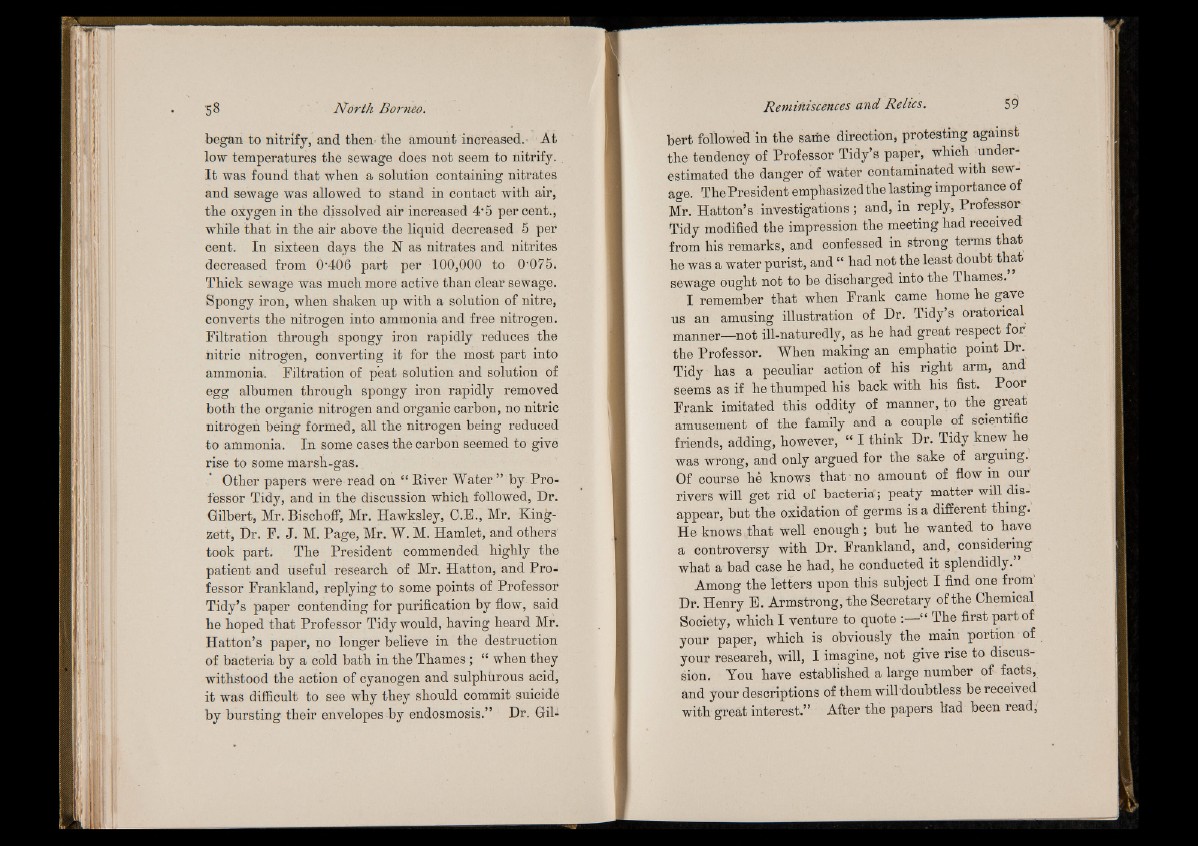
began to nitrify, and then the amount increased. At
low temperatures the sewage does not seem to nitrify.
I t was found that when a solution containing nitrates
and sewage was allowed to stand in contact with air,
the oxygen in the dissolved air increased 4'5 percent.,
while that in the air above the liquid decreased 5 per
cent. In sixteen days the N as nitrates and nitrites
decreased from 0*406 part per 100,000 to 0'075s
Thick sewage was much more active than clear sewage.
Spongy iron, when shaken up with a solution of nitre,
converts the nitrogen into ammonia and free nitrogen.
Filtration through spongy iron rapidly reduces the
nitric nitrogen, converting it for the most part into
ammonia. Filtration of peat solution and solution of
egg albumen through spongy iron rapidly removed
both the organic nitrogen and organic carbon, no nitric
nitrogen being formed, all the nitrogen being reduced
to ammonia. In some cases the carbon seemed to give
rise to some marsh-gas.
Other papers were read on “ River Water” by Professor
Tidy, and in the discussion which followed, Dr.
Gilbert, Mr. Bischoff, Mr. Hawksley, C.E., Mr. King-
zett, Dr. F. J. M. Page, Mr. W. M. Hamlet, and others'
took part. The President commended highly the
patient and useful research of Mr. Hatton, and Professor
Frankland, replying to some points of Professor
Tidy’s paper contending for purification by flow, said
he hoped that Professor Tidy would, having heard Mr.
Hatton’s paper, no longer believe in the destruction
of bacteria by a cold bath in the Thames; “ when they
withstood the action of cyanogen and sulphurous acid,
it was difficult to see why they should commit suicide
by bursting their envelopes by endosmosis.” Dr. Gilbert
followed in the sarhe direction, protesting against
the tendency of Professor Tidy’s paper, which underestimated
the danger of water contaminated with sewage.
The President emphasized the lasting importance of
Mr. Hatton’s investigations; and, in reply, Professor
Tidy modified the impression the meeting had received
from his remarks, and confessed in strong terms that
he was a water purist, and “ had not the least doubt that
sewage ought not to be discharged into the Thames.”
I remember that when Frank came home he gave
us an amusing illustration of Dr. Tidy’s oratorical
manner—not ill-naturedly, as he had great respect for
the Professor. When making an emphatic point Dr.
Tidy has a peculiar action of his right arm, and
seems as if he thumped his back with his fist. Poor
Frank imitated this oddity of manner, to the great
amusement of the family and a couple of scientific
friends, adding, however, “ I think Dr. Tidy knew he
was wrong, and only argued for the sake of arguing.
Of course he knows that no amount of flow m our
rivers will get rid of bacterisf; peaty matter will disappear,
but the oxidation of germs is a different thing.
He knows that well enough; but he wanted to have
a controversy with Dr. Frankland, and, considering
what a bad case he had, he conducted it splendidly.
Among the letters upon this subject I find one from
Dr. Henry E. Armstrong, the Secretary of the Chemical
Society, which I venture to quote : “ The first part of
your paper, which is obviously the main portion of
your research, will, I imagine, not give rise to discussion.
You have established a large number of facts,
and your descriptions of them will'doubtless be received
with great interest.” After the papers had been read,